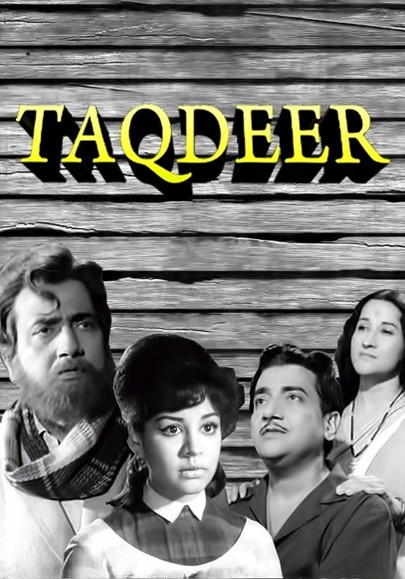Kaise Koi Jane Bhala
| Song Title | Kaise Koi Jane Bhala |
| Movie Title | Taqdeer |
| Date Released (India) | February 3, 1967 |
| Date Released (Trinidad) | Unknown |
| Singer | Mohammed Rafi |
| Lyricist | Anand Bakshi |
| Composer | Laxmikant-Pyarelal |
| Starring | Bharat Bhushan, Shalini Mardolkar, and Farida Jalal |
Music video of Kaise Koi Jane Bhala from the movie Taqdeer.
Song Lyrics
| Mohammed Rafi | Mohammed Rafi |
| Kaise koi, jane bala, khwabo ki tabir Aakhash pe, baitha hua, likhta hai vo taqdeer | How can one know the interpretation of dreams? While sitting in heaven, God writes the destiny of man |
| Kis rang se, jane bane, jivan ki tasvir Aakhash pe, baitha hua, likhta hai vo taqdeer | Who knows with which shade the picture of life will be made? While sitting in heaven, God writes the destiny of man |
| Kaise koi, jane bala, khwabo ki tabir Aakhash pe, baitha hua, likhta hai vo taqdeer | How can one know the interpretation of dreams? While sitting in heaven, God writes the destiny of man |
| Jisko khushi se jina ho Ye baat vo jaan le Marji ho jo bhagwan ki Hans ke use man le Mann le … | The one who wants to live happily Let that one know this Whatever God wills Obey that gladly Obey! |
| Jis se bani, rhum bhi khushi, hai ye wahi tadbir Aakhash pe, baitha hua, likhta hai vo taqdeer | Kindness and happiness both come from the same thoughts While sitting in heaven, God writes the destiny of man |
Mohammed Rafi |
Kaise koi, jane bala, khwabo ki tabir Aakhash pe, baitha hua, likhta hai vo taqdeer |
Kis rang se, jane bane, jivan ki tasvir Aakhash pe, baitha hua, likhta hai vo taqdeer |
Kaise koi, jane bala, khwabo ki tabir Aakhash pe, baitha hua, likhta hai vo taqdeer |
Jisko khushi se jina ho Ye baat vo jaan le Marji ho jo bhagwan ki Hans ke use man le Mann le … |
Jis se bani, rhum bhi khushi, hai ye wahi tadbir Aakhash pe, baitha hua, likhta hai vo taqdeer |
| Mohammed Rafi |
| Kaise koi, jane bala, khwabo ki tabir Aakhash pe, baitha hua, likhta hai vo taqdeer |
| Kis rang se, jane bane, jivan ki tasvir Aakhash pe, baitha hua, likhta hai vo taqdeer |
| Kaise koi, jane bala, khwabo ki tabir Aakhash pe, baitha hua, likhta hai vo taqdeer |
| Jisko khushi se jina ho Ye baat vo jaan le Marji ho jo bhagwan ki Hans ke use man le Mann le … |
| Jis se bani, rhum bhi khushi, hai ye wahi tadbir Aakhash pe, baitha hua, likhta hai vo taqdeer |
| Mohammed Rafi |
| How can one know the interpretation of dreams? While sitting in heaven, God writes the destiny of man |
| Who knows with which shade the picture of life will be made? While sitting in heaven, God writes the destiny of man |
| How can one know the interpretation of dreams? While sitting in heaven, God writes the destiny of man |
| The one who wants to live happily Let that one know this Whatever God wills Obey that gladly Obey! |
| Kindness and happiness both come from the same thoughts While sitting in heaven, God writes the destiny of man |
About The Lyrics
The Hindi lyrics for this song were obtained from the LyricsMotion website [1] and re-written based on the Hindi lyrics at Nasir’s Eclectic Blog [2]. The English translation of the song was mostly obtained from Nasir’s Eclectic Blog [2]. The final version of the translation was put together by P. Mohan [3] using Google Translate (Hindi to English).
Fun Facts
The word “khwabo” (ख़्वाबों), of Persian origin, means “dreams“, while “tabeer” (ताबीर), an Arabic word, means “interpretation.” The combination of these words poses the central question of the song: How can one interpret the unknowable intentions of fate? The lyrics continue this spiritual theme, with the phrase “Aakash pe, baitha hua, likhta hai vo taqdeer” (आकाश पे बैठा हुआ लिखता है वो तकदीर), which translates to “Sitting in the heavens, He writes destiny“. The word “taqdeer” (तकदीर) is of Arabic origin and is a common term for “destiny” or “fate“, reinforcing the idea that a higher power controls our lives.
The song’s philosophical depth is further revealed through its use of other powerful words and concepts. The phrase “jeevan ki tasveer” (जीवन की तस्वीर) means “the picture of life“, a metaphor for the unpredictable journey we are on. The advice given in the song is to accept the will of God (Bhagwan), and to find happiness by embracing whatever destiny brings. The final lines poetically link kindness and happiness to divine will with the words “reham” (रहम), meaning “kindness“, and “khushi” (ख़ुशी), meaning “happiness“. These concepts, it is said, originate from the same divine thoughts (tadbir). This song is a classic in Hindi cinema for its deep spiritual and philosophical message.
References
[1] https://www.lyricsmotion.com/song/lyrics/kaise-koi-jane-bhala
[2] https://nasir-eclectic.blogspot.com/2010/07/632-philosophical-song-of-rafi-kaise.html
[3] Mohan, Permanand. Life in Trinidad: A Journey Through Bollywood Film Songs and Trini Calypso. https://lifeintrinidad.org/

